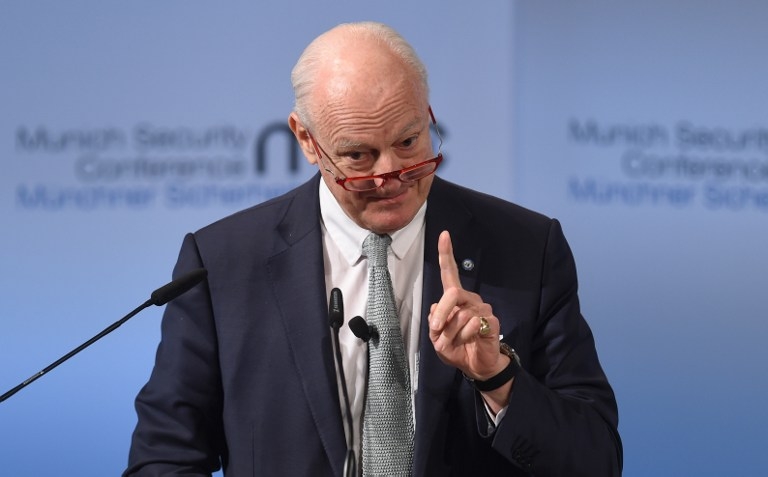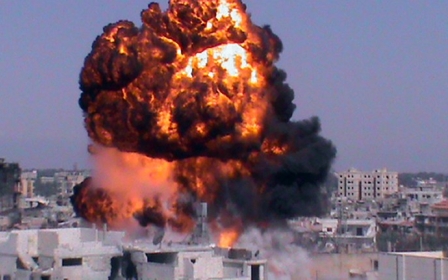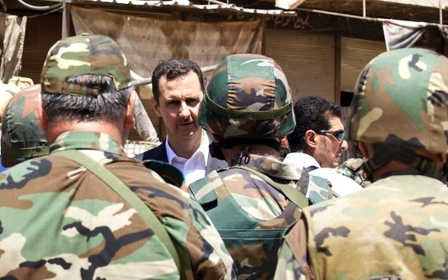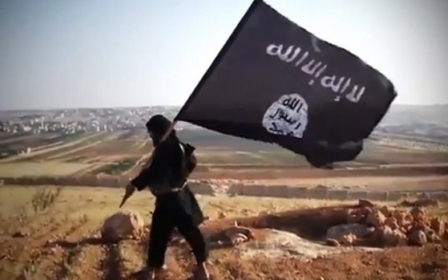Syrian opposition says ready for Geneva talks, but Assad must go

The Syrian opposition is fully committed to peace talks in Geneva on 23 February, a senior official said on Sunday, adding that the talks must pave the way for a political transition.
"We are fully committed for the Geneva talks," Syrian National Coalition President Anas al-Abdah told delegates at the Munich Security Conference in Germany. "We cannot address the profound security threats ... while Assad remains in power," he said.
The United Nations and other parties to Syrian peace efforts softened any expectations of a major breakthrough, with US policy on the crisis in disarray and its ties with Russia unclear.
Brett McGurk, the US envoy to the coalition against the Islamic State (IS) group, said the new US administration was still reviewing its Syria position, but that it was seeking a role to reinforce Russian and Turkish efforts to cement a ceasefire in the country.
UN envoy Staffan de Mistura told the Munich Security Conference the lack of a clear US position made resolving the complex issues of the six-year civil war far more complicated than his earlier mediation efforts for Iraq and Afghanistan.
"I can't tell you [if it will succeed], but we have to push with the momentum. Even a ceasefire cannot hold too long if there is no political [solution]," he said, referring to the shaky ceasefire brokered by Russia and Turkey in the Kazakh capital Astana.
The United Nations and other parties to Syrian peace efforts have softened any expectations of a major breakthrough, with US policy on the crisis in disarray and its ties with Russia unclear.
"One thing I’m missing at the moment ... is a clear US strategy,” de Mistura told delegates in Munich. "I can’t tell you, because I don’t know.”
Rebels warn over government attacks
Syrian rebel groups who participated in the Astana talks said on Sunday that an upsurge in Syrian army shelling and bombing was wrecking the prospects of maintaining a Russian-Turkish-brokered ceasefire.
The rebel groups, mostly backed by Turkey, said they had supported a political solution to end the bloodshed, but that war had been "imposed" on them by the Syrian army and its allies.
In a statement, they said they reserved the right to respond to these attacks, which have mostly taken place in the south, in Homs and in the outskirts of Damascus.
The UN-led intra-Syrian talks are set to resume in Geneva after de Mistura broke them off almost nine months ago following several rounds that led ultimately to an escalation of violence.
Syrian President Bashar al-Assad is in his strongest position since the early days of the civil war, which began as a popular uprising in the spring of 2011 before spiralling into a war that has killed as many as 400,000 combatants and civilians.
He told French media last week that he deemed all those fighting him to be terrorists, signalling that the government delegation is likely to take a hard line in the Geneva talks.
De Mistura said the talks will focus on a new constitution, free and fair elections administered under supervision of the UN, and transparent and accountable governance.
Several delegates questioned him on why the UN was no longer using the phrase "political transition" to describe the goals of the talks. The opposition considers the term to mean a removal of Assad or at least an erosion of his powers.
De Mistura did not answer directly, but said he remained focused on UN Security Council resolution 2254, with its focus on governance, a new constitution and elections.
US envoy McGurk said the administration was doing a full review of its Syria policy that is due to be completed in the coming weeks, but cautioned against setting expectations too high.
"I don’t think the US will come in with a one-size-fits-all solution because there isn’t one," McGurk told delegates to the annual security conference.
McGurk said Washington was focused heavily on liberating Raqqa from IS control.
New MEE newsletter: Jerusalem Dispatch
Sign up to get the latest insights and analysis on Israel-Palestine, alongside Turkey Unpacked and other MEE newsletters
Middle East Eye delivers independent and unrivalled coverage and analysis of the Middle East, North Africa and beyond. To learn more about republishing this content and the associated fees, please fill out this form. More about MEE can be found here.




